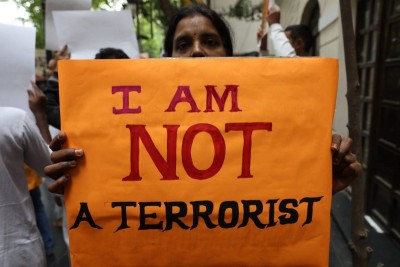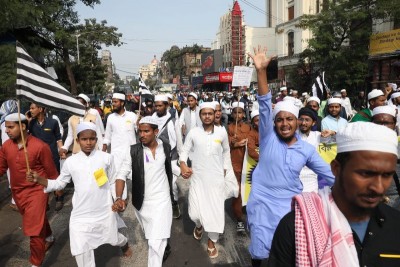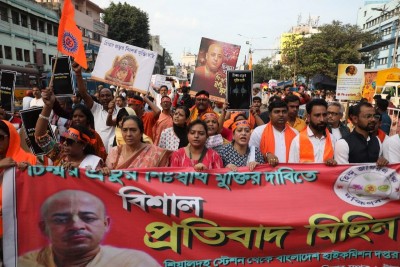
Sabarimala Verdict: Is Justice Indu Malhotra's dissent a moral victory for respondents?
New Delhi, Oct 1 (IBNS): The Supreme Court on Friday ruled against the age-old practice of not allowing women of a certain age group to enter the 800-year-old Sabarimala Temple in Kerala, dedicated to Lord Ayyappa.
The decision was passed 4-1 in favour of those seeking to squash the tradition and allow women of all age groups to enter the shrine.
The 5-member Supreme Court bench was made up of four men and a lady and ironically, it was Justice Indu Malhotra who dissented.
She is the judge who in the recent historic judgement on decriminalizing gay sex in India had famously said 'history owes an apology... for the delay in providing redressal for the ignominy and ostracism that they [LGBTQ community] suffered through the centuries".
Giving her views, Justice Malhotra, who was the second woman to be designated as Senior Advocate by the Supreme Court in 2007, said that the apex court cannot entertain Public Interest Litigation/s (PILs) challenging religious practices as it could harm India's secular nature.
"In a pluralistic society comprising of people with diverse faiths, beliefs and traditions, to entertain PILs challenging religious practices followed by any group, sect or denomination, could cause serious damage to the constitutional and secular fabric of this country," observed Justice Malhotra, the Bangalore born judge who was a member of the Vishaka Committee that the issue of sexual harassment at the workplace.

While the other members in the bench said that not allowing women of all ages to enter the temple violates Article 14 (equality before the law) of the Indian constitution, Justice Malhotra remarked that it cannot be the sole yardstick while delivering the judgement.
Justice Malhotra, who had authored the third edition of The Law and Practice Arbitration and Conciliation, 2014, stated that Article 25 (freedom of religion) "is conditioned by the essential beliefs and practices of any religion. Equality in matters of religion must be viewed in the context of the worshippers of the same faith."
Meanwhile, Justice DY Chandrachud observed that "religion cannot be a cover to deny women right to worship."
"To treat women as children of lesser God is to blink at Constitutional morality," he added.
Speaking on the matter Justice Malhotra, who did her schooling in Delhi and her Bachelor of Arts from Lady Shri Ram College in the national capital as well, said that it was specifically the Lord Ayyappa Temple in Sabarimala which denied entry to women of certain ages, while there are 1000 temples dedicated to the same God that did not impose any such restrictions.
In Sabarimala, Lord Ayyappa has manifested himself as a Naishtik Brahamachari, which rules out women of childbearing age to visit the shrine.
Meanwhile, taking a swipe at Justice Chandrachud for his 'children of lesser God' comment, BJP leader Tejaswi Surya asked if the apex court would not look at discrimination meted out by other religions.
"Mi Lord, what about religions that hold Gods of other faiths as not just lesser ones, but as false? What about fate to which followers of false Gods are eternally condemned? Will my lords outlaw such religions as well, holding them to violate constitutional morality?" he asked.
While the petitioners argued that the move to disallow women violated Article 17 (abolition of untouchability), thus equating women rights with Dalit's, the lady Justice said that it is misconceived.
"The right asserted by Dalits was in pursuance of right against systematic social exclusion and for social acceptance per se. In the case of temple entry, social reform preceded the statutory reform, and not the other way about," she said.
Her judgement has been lauded by Lawyer Sai Deepak Aiyer, one of the respondents in the case.
"Her Ladyship, the sole woman, Ms. Indu Malhotra, is the sole voice of dissent and agrees with the position of the #ReadytoWait campaign in principle. Her Ladyship has acknowledged that there exists a distinction between diversity and discrimination. Swamiye Saranam Ayyappa!" the lawyer tweeted.
Sabarimala, however, is not the only place of worship in India which does not allow women to enter the shrine. It is a common practice in most mosques too. One wonders if the Supreme Court will go about changing such prevalent systems.

There lies real problems
In his piece for Firstpost, MA Deviah, who has been making the Sabarimala trek for over two decades now, said that there are real problems which anyway rules out a majority of the women from experiencing it.
"The wrath of God apart; there are other real issues for women wanting to make this trek. The lack of toilets and other facilities, for instance, is a genuine problem. The Sabarimala’s hilltop infrastructure is woefully inadequate, stretched beyond anything the Kerala government can develop and maintain. Sabarimala does not have enough toilets to cater to the needs of the hundreds of thousands of pilgrims that visit the shrine during the season. While a few are lucky enough to find clean unisex toilets, the only choice for the rest is open defecation," he wrote.
Deviah has also warned the Kerala government to be careful about its dealing with the issue.
"While the Kerala government seems to have welcomed the judgment, it would be careful about doing anything that would interfere with the divinity of the place. With hundreds of crores of rupees in collections, Sabarimala is a major source of income for the government. Not to mention the enormous amount of money that the pilgrims spend in the state and the jobs generated by it," he said.
(Writing by Sudipto Maity)
Images; Creative Commons / YouTube Grabs
Support Our Journalism
We cannot do without you.. your contribution supports unbiased journalism
IBNS is not driven by any ism- not wokeism, not racism, not skewed secularism, not hyper right-wing or left liberal ideals, nor by any hardline religious beliefs or hyper nationalism. We want to serve you good old objective news, as they are. We do not judge or preach. We let people decide for themselves. We only try to present factual and well-sourced news.







